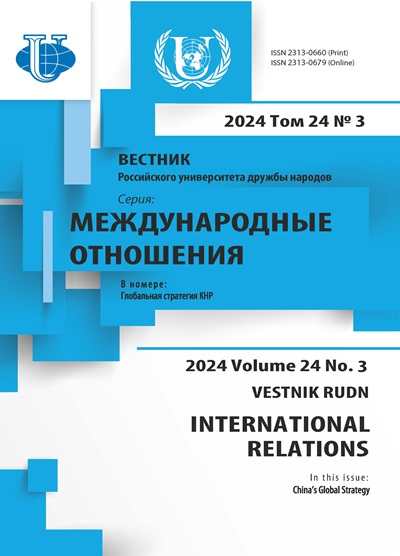The Islamist Challenge in the Greater Mediterranean
- Authors: Dolgov B.V.1
-
Affiliations:
- Institute of Oriental Studies, Russian Academy of Sciences
- Issue: Vol 21, No 4 (2021): The Greater Mediterranean: Still Constructing the Macro-region
- Pages: 655-670
- Section: THEMATIC DOSSIER
- URL: https://journals.rudn.ru/international-relations/article/view/29812
- DOI: https://doi.org/10.22363/2313-0660-2021-21-4-655-670
Cite item
Full Text
Abstract
The article examines and analyzes the spread of Islamism or Political Islam movements in the Greater Mediterranean and their increasing influence on the socio-political situation in 2011-2021. The historical factors, which contributed to the emergence of the hearths of Islamic culture in the countries which entered the Arab Caliphate in the Greater Mediterranean parallel with the Antique centers of European civilization, are retrospectively exposed. The Islamist ideologues called the Ottoman Imperia the heir of the Arab Caliphate. The main doctrinal conceptions of Political Islam and its more influential movement “Muslim Brotherhood” (forbidden in Russia) are discovered. The factor of the Arab Spring, which considerably influenced the strengthening of the Islamist movements, as well as its continuation of the protests in the Arab countries in 2018-2021, is examined. The main attention is allotted to analyzing the actions of the Islamic movements in Tunisia, Egypt, Algeria, and in the Libyan and Syrian conflicts too. The influence of external actors, the most active of which was Turkey, is revealed. The author also analyzes the situation in the Arab-Muslim communities in the European Mediterranean on the example of France, where social-economic problems, aggravated by COVID-19, have contributed to the activation of radical Islamist elements. It is concluded that confronting the Islamist challenge is a complex and controversial task. Its solution depends on both forceful opposition to radical groups and an appropriate foreign policy. An important negative factor is the aggravation of socio-economic problems and crisis phenomena in the institutions of Western democracy, in response to which the ideologues of Islamism preach an alternative world order in the form of an “Islamic state”. At the moment the Western society and the countries which repeat its liberal model do not give a distinct response to this challenge.
About the authors
Boris V. Dolgov
Institute of Oriental Studies, Russian Academy of Sciences
Author for correspondence.
Email: dolgov.boris@list.ru
ORCID iD: 0000-0001-6541-5862
PhD, Dr. Sc. (History), Leading Research Fellow, Institute of Oriental Studies, Russian Academy of Sciences; Leading Research Fellow, Institute of Scientific Information for Social Sciences, Russian Academy of Sciences
Moscow, Russian FederationReferences
- Alaev, L. B, & Ashrafyan, K. Z. (Eds.). (2002). History of the East. Vol. 2. The East in the Middle Ages. Moscow: Izdatel’skaya firma “Vostochnaya literatura” RAN publ. (In Russian).
- Al-Ahnaf, M., Botiveau, B., & Fregosi, F. (1991). L’Algérie par ses islamistes. Paris: Karthala.
- Al-Gannushi, R. (1984). Al-Harakat al-islamiya vat-tajdid [Islamic movement and renovation]. Hartum: Dar al-fikr. (In Arabic).
- Al-Madini, T. (2011). Sukut ad-daula al-buliciya fi Tunis [Crash of police-state in Tunisia]. Beirut: Arab Scientific Publishers. (In Arabic).
- Baranovsky, V. G., & Naumkin, V. V. (Eds.). (2018). The Middle East in the changing global context. Moscow: IV RAN publ. (In Russian).
- Bolshakov, O. G. (2000). History of Caliphate. Vol. 1. Moscow: Izdatel’skaya firma “Vostochnaya literatura” RAN publ. (In Russian).
- Bowen, J. R. (2011). L’islam á la française. Paris: Steinks Editions.
- Dolgov, B. V. (2017). Phenomenon of the Arab Spring 2011—2016: Causes, development, perspectives. Tunisia, Egypt, Libya, Syria, Algeria. Moscow: LENAND publ. (In Russian).
- Dolgov, B. V. (2018). Islamist movement in Algeria and Tunisia: 1970—2017. Moscow: LENAND publ. (In Russian).
- Dolgov, B. V. (2021a). Russia and Turkey in regional and geopolitical space. Outlines of Global Transformations: Politics, Economics, Law, 14(3), 147—160. (In Russian). https://doi.org/10.23932/2542-0240-2021-14-3-8
- Dolgov, B. V. (2021b). Syrian withstanding: Internal and external factors (2011—2021). Moscow: LENAND publ. (In Russian).
- Ennasri, N. (2013). L’enigme du Qatar. Paris: Iris Edition.
- Islam: Encyclopedic dictionary (1991). Moscow: Nauka publ. (In Russian).
- Kepel, G. (2015). Terreur dans l’Hexagon. Paris: Gallimard.
- Kepel, G. (2018). Sortir du chaos. Les crises en Méditerrannée et au Moyen-Orient. Paris: Gallimard.
- Khodynskaya-Golenischeva, M. S. (2019). Syria: A difficult path from the war to the world. Multilateral diplomacy of the Syrian settlement. Moscow: Abris publ. (In Russian).
- Nadein-Raevskiy, V. A. (2018). Panturkism: From the Ottoman Empire until our days. Мoscow: Russkaya panorama publ. (In Russian).
- Pir-Budagova, E. P. (2015). History of Syria 20th century. Moscow: IV RAN publ. (In Russian).
- Ramadan, T. (2008). Face à nos peurs: Le choix de la confiance. Paris: Tawhid.
- Rougier, B. (2008). Qu’est ce que le salafisme? Paris: PUF.
- Shaaban, A. A. (2012). Ashaab yurid…! [People wants…!]. Beirut: Atlas Edition. (In Arabic).
- Stern, J., & Berger, J. M. (2015). ISIS: The state of terror. Washington: Harper Collins Publishers.
- Thomson, D. (2014). Les français djihadistes. Paris: Arenes.
- Willis, M. (1997). The Islamist challenge in Algeria. New York: New York University Press.
- Zarka, Y. Ch., Taussig, S., & Fleury, Ch. (Eds.). (2004). L’islam en France. Paris: PUF.











